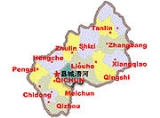
Qichun
Encyclopedia
Qichun County is a county of Huanggang, Hubei
, China
.
Qichun County is the birthplace of famous herbalist Li Shizhen
, who was born and lived in Qizhou
town, on the southern edge of the County, alongside the Yangtze River
. In turn, Qichun is a major center of the herbal industry in China.
Qichun County is known in China as the "County of Scholars" because more professors (400+) and doctors were born there than in any other county of China. The town of Qichun consists of Qichun proper, and Caohe precinct.
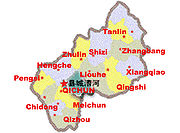
. Due to its strategic location, in history Qichun was referred to as “The Key Point in Jinchu” (Jinchu was the ancient name for the region).
Centuries later, in the summer of 223
AD in the Three Kingdoms
period, Eastern Wu
general He Qi
attacked and eliminated an outpost of Wei in the new commandery territory of Qichun, on the southern slopes of the Dabie Shan
mountains. But for the next twelve months the northern front remained quiet.
The Grand Administrator of Qichun was Jin Zong, a former officer of Sun Quan
who had deserted and joined Cao Wei
. It appears he was given the commandery appointment at this time, in the hill country of the Dabie Shan on the border region between Lujiang and Jiangxia, so that he could disturb the communications routes along the Yangtze and across that river to the south.
There is evidence that the Qichun commandery had been established a few years earlier, evidently on the basis of the county of that name in Jiangxia commandery of Later Han
, but the territory had been abandoned by Cao Cao
at the time of his withdrawal in 213 AD. From this time, after the defeat of Jin Zong's infiltration, the territory was held by Wu. One of the subordinate commanders in He Qi's attack on Qichun was Mi Fang
, the erstwhile officer of Guan Yu
who had surrendered Jiangling to Lü Meng
in 219
AD. Qichun also was evidently a proving ground for renegades.
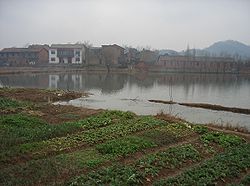 The total geographic area of Qichun County is 2,400 km². Of this, 560 km² are arable. Water covers 310 km² (there are hundreds of lakes in Qichun County, almost all used for aquaculture). Forested areas cover 1,040 km².
The total geographic area of Qichun County is 2,400 km². Of this, 560 km² are arable. Water covers 310 km² (there are hundreds of lakes in Qichun County, almost all used for aquaculture). Forested areas cover 1,040 km².
(Note: While not stated in government data, unless there is a statistical error, the remaining 490 km² must be hills/mountains, in the northern part of the County, or simply unusable land).
floods, Qichun County also experiences some flooding.
More-recent famous people from Qichun include:
The government buildings for the County and the Town are adjacent to each other, and are just across the street from the relatively new Qichun Hotel (below).
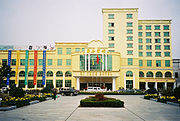 There is only one hotel of any significance in Qichun. But it is a new hotel, built around 2001.
There is only one hotel of any significance in Qichun. But it is a new hotel, built around 2001.
It has a spacious lobby, with a 10-pin bowling alley off one side, and a large banquet/dining hall on the other.
There is a large garden surrounding the property. Rooms are comfortable and the Hotel would be rated about 3-stars by Western standards.
Another major local hotel is Honglou Hotel with delicate private dining rooms.
 Qichun is reasonably well-served by rail, bus, and road transportation; there is no airport.
Qichun is reasonably well-served by rail, bus, and road transportation; there is no airport.
The main Beijing
to Guangzhou
rail line passes through Qichun, and there are local trains, west to the Hubei
provincial capital of Wuhan
and south-east into Jiangxi
province.
There is a local bus service and also frequent express buses into Wuhan
via the new inter-provincial expressway running east-west across the province. A journey by express bus to Wuhan
takes less than three hours; by car the journey is less than 2.5 hours.
Local roads (including that into town from the expressway) are rough and full of pot holes. However, downtown streets are well paved with good sidewalks. There are few cars thus far in Qichun, but many motorbikes. Taxis are of the 3-wheel motorbike-with-cab type.
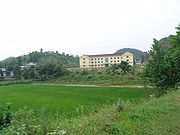 Qichun County has its own Social Welfare Institute (SWI) to accommodate elderly people, handicapped persons, the homeless, and orphans. The Social Welfare Institute constructed a new building in 2004, designed mainly for the elderly and handicapped children and adults. Children which are abandoned or orphaned, and are awaiting adoption either domestically or internationally, are placed with local foster families. But they visit the SWI weekly for medical checks and group playtime activities. About 400 orphans have been adopted internationally from Qichun County SWI. These children now live with families all over the world: in Canada and the U.S.A., in Australasia, and in most countries of Western Europe.
Qichun County has its own Social Welfare Institute (SWI) to accommodate elderly people, handicapped persons, the homeless, and orphans. The Social Welfare Institute constructed a new building in 2004, designed mainly for the elderly and handicapped children and adults. Children which are abandoned or orphaned, and are awaiting adoption either domestically or internationally, are placed with local foster families. But they visit the SWI weekly for medical checks and group playtime activities. About 400 orphans have been adopted internationally from Qichun County SWI. These children now live with families all over the world: in Canada and the U.S.A., in Australasia, and in most countries of Western Europe.
Huanggang, Hubei
Huanggang City is a major municipality in eastern Hubei Province, China. It is situated to the north of the middle reaches of the Yangtze River and is bounded in the north by the Dabie Shan mountain range....
, China
China
Chinese civilization may refer to:* China for more general discussion of the country.* Chinese culture* Greater China, the transnational community of ethnic Chinese.* History of China* Sinosphere, the area historically affected by Chinese culture...
.
Qichun County is the birthplace of famous herbalist Li Shizhen
Li Shizhen
Li Shizhen , courtesy name Dongbi , was one of the greatest Chinese herbologists and acupuncturists in Chinese history. His major contribution to medicine was his 27-year work, which is found in his epic book the Bencao Gangmu...
, who was born and lived in Qizhou
Qizhou
Qizhou is a township-level division situated in Baoding, Hebei, China....
town, on the southern edge of the County, alongside the Yangtze River
Yangtze River
The Yangtze, Yangzi or Cháng Jiāng is the longest river in Asia, and the third-longest in the world. It flows for from the glaciers on the Tibetan Plateau in Qinghai eastward across southwest, central and eastern China before emptying into the East China Sea at Shanghai. It is also one of the...
. In turn, Qichun is a major center of the herbal industry in China.
Qichun County is known in China as the "County of Scholars" because more professors (400+) and doctors were born there than in any other county of China. The town of Qichun consists of Qichun proper, and Caohe precinct.

History
The earliest known founding of Qichun was in 201 BC201 BC
Year 201 BC was a year of the pre-Julian Roman calendar. At the time it was known as the Year of the Consulship of Lentulus and Paetus...
. Due to its strategic location, in history Qichun was referred to as “The Key Point in Jinchu” (Jinchu was the ancient name for the region).
Centuries later, in the summer of 223
223
Year 223 was a common year starting on Wednesday of the Julian calendar. At the time, it was known as the Year of the Consulship of Maximus and Aelianus...
AD in the Three Kingdoms
Three Kingdoms
The Three Kingdoms period was a period in Chinese history, part of an era of disunity called the "Six Dynasties" following immediately the loss of de facto power of the Han Dynasty rulers. In a strict academic sense it refers to the period between the foundation of the state of Wei in 220 and the...
period, Eastern Wu
Eastern Wu
Eastern Wu, also known as Sun Wu, was one the three states competing for control of China during the Three Kingdoms period after the fall of the Han Dynasty. It was based in the Jiangnan region of China...
general He Qi
He Qi
He Qi , style name Gongmiao , was an official serving under the warlord Sun family of Eastern Wu during the late Han Dynasty and Three Kingdoms period of Chinese history....
attacked and eliminated an outpost of Wei in the new commandery territory of Qichun, on the southern slopes of the Dabie Shan
Dabie Shan
The Dabie Mountains are a major mountain range located in central China. Running northwest-to-southeast, they form the main watershed between the Huai and Yangtze rivers...
mountains. But for the next twelve months the northern front remained quiet.
The Grand Administrator of Qichun was Jin Zong, a former officer of Sun Quan
Sun Quan
Sun Quan , son of Sun Jian, formally Emperor Da of Wu, was the founder of Eastern Wu during the Three Kingdoms period of Chinese history. He ruled from 222 to 229 as King of Wu and from 229 to 252 as Emperor of Wu....
who had deserted and joined Cao Wei
Cao Wei
Cao Wei was one of the states that competed for control of China during the Three Kingdoms period. With the capital at Luoyang, the state was established by Cao Pi in 220, based upon the foundations that his father Cao Cao laid...
. It appears he was given the commandery appointment at this time, in the hill country of the Dabie Shan on the border region between Lujiang and Jiangxia, so that he could disturb the communications routes along the Yangtze and across that river to the south.
There is evidence that the Qichun commandery had been established a few years earlier, evidently on the basis of the county of that name in Jiangxia commandery of Later Han
Han Dynasty
The Han Dynasty was the second imperial dynasty of China, preceded by the Qin Dynasty and succeeded by the Three Kingdoms . It was founded by the rebel leader Liu Bang, known posthumously as Emperor Gaozu of Han. It was briefly interrupted by the Xin Dynasty of the former regent Wang Mang...
, but the territory had been abandoned by Cao Cao
Cao Cao
Cao Cao was a warlord and the penultimate chancellor of the Eastern Han Dynasty who rose to great power during the dynasty's final years. As one of the central figures of the Three Kingdoms period, he laid the foundations for what was to become the state of Cao Wei and was posthumously titled...
at the time of his withdrawal in 213 AD. From this time, after the defeat of Jin Zong's infiltration, the territory was held by Wu. One of the subordinate commanders in He Qi's attack on Qichun was Mi Fang
Mi Fang
Mi Fang was an official serving under the warlord Liu Bei during the late Han Dynasty and Three Kingdoms era of Chinese history. He was also the younger brother of Mi Zhu, who also served Liu Bei. In 219, Mi Fang surrendered to Sun Quan, directly resulting in the loss of Jing Province and the...
, the erstwhile officer of Guan Yu
Guan Yu
Guan Yu was a general serving under the warlord Liu Bei during the late Eastern Han Dynasty of China. He played a significant role in the civil war that led to the collapse of the Han Dynasty and the establishment of the state of Shu Han during the Three Kingdoms period, of which Liu Bei was the...
who had surrendered Jiangling to Lü Meng
Lü Meng
Lü Meng was a military general serving under the warlord Sun Quan during the late Han Dynasty period of Chinese history. He served as the commanding general in the invasion of Jing Province that led to the death of Guan Yu.-Early life:Lü Meng was born in Fupo, Runan Commandery in 178...
in 219
219
Year 219 was a common year starting on Friday of the Julian calendar. At the time, it was known as the Year of the Consulship of Antonius and Sacerdos...
AD. Qichun also was evidently a proving ground for renegades.
Geography

(Note: While not stated in government data, unless there is a statistical error, the remaining 490 km² must be hills/mountains, in the northern part of the County, or simply unusable land).
Climate
The local climate is classed as "subtropical mainland monsoon," with distinct seasons and abundant rainfall (average 134 centimeters per year). When the Yangtze RiverYangtze River
The Yangtze, Yangzi or Cháng Jiāng is the longest river in Asia, and the third-longest in the world. It flows for from the glaciers on the Tibetan Plateau in Qinghai eastward across southwest, central and eastern China before emptying into the East China Sea at Shanghai. It is also one of the...
floods, Qichun County also experiences some flooding.
Population
Total County population was 949,700 at the last census. Qichun Town's population was 162,000, of whom 71,000 were engaged in agriculture (fisheries, crops, and herbs are the main agricultural sectors) and the remainder non-agriculture (which includes minerals and manufacturing of various kinds). About 40% of all the farmers of Qichun County are engaged in growing herbs.Local character and folklore
The County has produced hundreds of scholars and doctors and is known as "The County of Scholars." Perhaps not surprisingly, the local character is considered "refined." Hubei people are known as (and refer to themselves as) "9-headed birds." This is meant as a compliment: they are both talkative and clever (9 mouths yacking; 9 brains thinking). Hubei people are said to be "square and sturdy" (that is, healthy, strong, and square-and-sturdy in appearance).Famous people
In addition to the famous herbalist Li Shizhen, another Qichun scholar from ancient times was Gu Jingxing (1621–1687), a prolific author of hundreds of books, and an Imperial scholar from a long hereditary line of scholars going back several generations of the Gu family.More-recent famous people from Qichun include:
- Wu Shu (writer and Communist revolutionary, 1902–1985);
- Hu FengHu FengHu Feng was a Chinese writer and literary and art theorist. He comes from Qichun in the province of Hubei. In 1929 he went to study in Japan. In 1933, he was expelled from Japan and he joined the League of the Left-Wing Writers in China in Shanghai. He was friends with Lu Xun...
(literary theorist, 1902–1985); - Huang KanHuang KanHuang Kan , courtesy name: Jigang , was a Chinese philologist.-Biography:A native of Hubei, he made the acquaintance of Zhang Binglin in Japan, who shared with him the same passion for revolution and philology. Huang became Zhang's comrade and student...
(Professor, newspaper founder, 1886–1935); - Zhan Dabei (Kuomingtan/KMT leftist, 1887–1927);
- Tian Tong (1879–1937, author and Minister of Internal Affairs in the revolutionary government of Sun Yatsen);
- Dong Yuhua (leader of student movement and military commander, 1907–1939);
- Yuan ShuYuan ShuYuan Shu was a warlord during the late Han Dynasty era of Chinese history. He rose to prominence following the collapse of the imperial court in 189. He was said to be a younger cousin of the warlord Yuan Shao, but was actually Yuan Shao's younger half-brother...
(government Minister, started Chinese Communist Party intelligence system, 1911–1987); - Gao Huiyuan (born 1922, medical scientist and doctor to Premier Zhou EnlaiZhou EnlaiZhou Enlai was the first Premier of the People's Republic of China, serving from October 1949 until his death in January 1976...
).
Government
The town of Qichun is in the Caohe precinct of Qichun County, the towns of Qichun and Caohe essentially having amalgamated geographically. Qichun town is the "county seat", as it were, of Qichun County.The government buildings for the County and the Town are adjacent to each other, and are just across the street from the relatively new Qichun Hotel (below).
Hotels

It has a spacious lobby, with a 10-pin bowling alley off one side, and a large banquet/dining hall on the other.
There is a large garden surrounding the property. Rooms are comfortable and the Hotel would be rated about 3-stars by Western standards.
Another major local hotel is Honglou Hotel with delicate private dining rooms.
Transportation

The main Beijing
Beijing
Beijing , also known as Peking , is the capital of the People's Republic of China and one of the most populous cities in the world, with a population of 19,612,368 as of 2010. The city is the country's political, cultural, and educational center, and home to the headquarters for most of China's...
to Guangzhou
Guangzhou
Guangzhou , known historically as Canton or Kwangchow, is the capital and largest city of the Guangdong province in the People's Republic of China. Located in southern China on the Pearl River, about north-northwest of Hong Kong, Guangzhou is a key national transportation hub and trading port...
rail line passes through Qichun, and there are local trains, west to the Hubei
Hubei
' Hupeh) is a province in Central China. The name of the province means "north of the lake", referring to its position north of Lake Dongting...
provincial capital of Wuhan
Wuhan
Wuhan is the capital of Hubei province, People's Republic of China, and is the most populous city in Central China. It lies at the east of the Jianghan Plain, and the intersection of the middle reaches of the Yangtze and Han rivers...
and south-east into Jiangxi
Jiangxi
' is a southern province in the People's Republic of China. Spanning from the banks of the Yangtze River in the north into hillier areas in the south, it shares a border with Anhui to the north, Zhejiang to the northeast, Fujian to the east, Guangdong to the south, Hunan to the west, and Hubei to...
province.
There is a local bus service and also frequent express buses into Wuhan
Wuhan
Wuhan is the capital of Hubei province, People's Republic of China, and is the most populous city in Central China. It lies at the east of the Jianghan Plain, and the intersection of the middle reaches of the Yangtze and Han rivers...
via the new inter-provincial expressway running east-west across the province. A journey by express bus to Wuhan
Wuhan
Wuhan is the capital of Hubei province, People's Republic of China, and is the most populous city in Central China. It lies at the east of the Jianghan Plain, and the intersection of the middle reaches of the Yangtze and Han rivers...
takes less than three hours; by car the journey is less than 2.5 hours.
Local roads (including that into town from the expressway) are rough and full of pot holes. However, downtown streets are well paved with good sidewalks. There are few cars thus far in Qichun, but many motorbikes. Taxis are of the 3-wheel motorbike-with-cab type.
Economy
The herbal industry, centered on Qizhou, is the biggest component of the Qichun County economy. Some 200,000 herb farmers live in Qichun County. They produce more than 700 varieties. The local herb wholesale market is the third largest in China, with more than 800 million yuan (US$100 million, as of 2006) of annual trading volume.Social welfare

External links
- "Hubei Sheng: Qichun Xian difang zhibian zuan wei yuan hui bian zuan." ("History of Qichun County in Hubei Province" in Chinese), published at Wuhan, by "Hubei kexue jishu chuban she" in 1997. (ISBN C47267C56)
- Qichun Government website (Chinese)
- Huanggang Government website (Chinese)
- Huanggang Government website (bilingual, Chinese-English)

